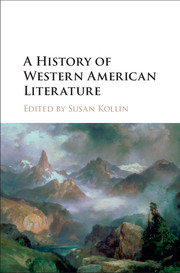Book contents
- Frontmatter
- Contents
- Notes on Contributors
- Acknowledgments
- Introduction: Historicizing the American Literary West
- PART I HOMELANDS
- PART II MAKING A REGION
- PART III GEOGRAPHIES OF THE LITERARY WEST
- PART IV THE TWENTIETH CENTURY AND BEYOND: LITERARY MOVEMENTS AND CRITICAL PERSPECTIVES
- 14 Early Cinematic Westerns
- 15 The Environmental Novel of the American West
- 16 Hard-Boiled Fiction and Noir Narratives
- 17 The Beats and the American West
- 18 Contested Wests: Indigenous Americans and the Literature of Sovereignty
- 19 Asian American Writers and the Making of the Western U.S. Landscape
- 20 African American Literature: Recasting Region through Race
- 21 Hollywood Westerns: 1930s to the Present
- 22 Urban New Wests
- 23 Queer Frontiers: Gender and Sexuality in the American West
- 24 Postwestern Literature and Criticism
- Selected Bibliography
- Index
23 - Queer Frontiers: Gender and Sexuality in the American West
from PART IV - THE TWENTIETH CENTURY AND BEYOND: LITERARY MOVEMENTS AND CRITICAL PERSPECTIVES
Published online by Cambridge University Press: 05 November 2015
- Frontmatter
- Contents
- Notes on Contributors
- Acknowledgments
- Introduction: Historicizing the American Literary West
- PART I HOMELANDS
- PART II MAKING A REGION
- PART III GEOGRAPHIES OF THE LITERARY WEST
- PART IV THE TWENTIETH CENTURY AND BEYOND: LITERARY MOVEMENTS AND CRITICAL PERSPECTIVES
- 14 Early Cinematic Westerns
- 15 The Environmental Novel of the American West
- 16 Hard-Boiled Fiction and Noir Narratives
- 17 The Beats and the American West
- 18 Contested Wests: Indigenous Americans and the Literature of Sovereignty
- 19 Asian American Writers and the Making of the Western U.S. Landscape
- 20 African American Literature: Recasting Region through Race
- 21 Hollywood Westerns: 1930s to the Present
- 22 Urban New Wests
- 23 Queer Frontiers: Gender and Sexuality in the American West
- 24 Postwestern Literature and Criticism
- Selected Bibliography
- Index
Summary
Western American literature figures the western landscape as offering clarity about the individual and about “America.” In this model, projects of self-discovery and national discovery and of self-definition and national definition merge and collude: To explore the West is to excavate the self, and to come to terms with the self amid the stark landscape of the West is to confront, and finally to understand truly, what it means to be American. But the paradox of the genre is that the space of self-discovery and self-reinvention, seemingly limitless under the endless sky and prairie, has stark boundaries. One's past inevitably catches up with one's present as soon as the landscape reveals intrusive signs of civilization: outposts, railroads, fences. Of course, the limits of the West reveal the limits of reinvention itself: The retired sheriff returns to duty reluctantly, the outlaw is exposed and made to answer for his previous misdeeds, the lone explorer returns to the settlement. Western American literature's investment in heterosexuality and heteronormative desire function similarly, butting up against their inevitable social and representational limits. The intense male homosociality of travel and exploration, of lonesome days on the range and all-night cattle drives, is heavily bounded by investments in heterosexuality and heteronormativity: the husband's relentless defense of the family homestead against attacks by Indians and drunken outlaws; the settlement school mistress's instructing children in reading and arithmetic and “civilization” amid the ever-encroaching wilds of the West; the male adventurer's, explorer's, or prospector's inevitable return to his waiting wife or his eventual, long-overdue marriage.
All of this changed with the publication of Annie Proulx's short story “Brokeback Mountain” in 1997 and Ang Lee's film adaptation in 2005. The story and the film recount the lives of the ranch hands Jack Twist and Ennis del Mar over a twenty-year period. The two meet in 1963 as twenty-something summer sheepherders working on Brokeback Mountain in Wyoming. After a night of whisky drinking, Jack makes a sexual advance toward Ennis, who, although momentarily reluctant, quickly responds in kind, and the two embark on a sexual and emotional relationship that lasts through the summer and over the ensuing twenty years, during which both men marry women.
- Type
- Chapter
- Information
- A History of Western American Literature , pp. 362 - 373Publisher: Cambridge University PressPrint publication year: 2015



